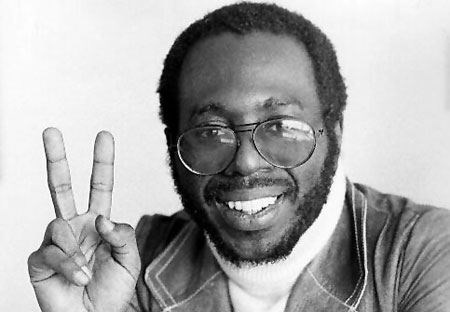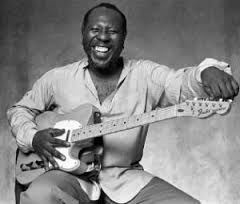Curtis Mayfield
by David from San Diego

|
| (www.soulwalking.co.uk ()) |
Born into a poor family on June 3, 1942, that was forced to move place to place in Chicago, rose a man from the dirt who touched the hearts of millions with his gospel-influenced rhythmic blues songwriting. This man who made his lyrics as important as his melody was no other than Curtis Mayfield. At an early age, Curtis was a member of a local gospel group with three cousins. This group, called the Northern Jubilee Gospel Singers, set a foundation for his musical career. Curtis Mayfield originally attended Wells High School north of Chicago before dropping out to venture out for his dream. In 1957, he joined a band later named The Impressions under Vee Jay Records. Curtis wrote their songs and toured in the United States, Europe, and Japan to promote the songs that Curtis originated for the band. Things were going well for them until Vee Jay Records dropped the band causing them to temporarily to split up. After splitting up, Curtis developed his own record studio titled Curtom. After a couple of years working on the label, Mayfield set out for a solo career. Unfortunately, during a concert set up while he was touring, a light tower near the stage collapsed right on top of Curtis' head. The man was left paralyzed from the neck down. Even though paralyzed, a comeback career struck and he made music until December 26, 1999, the date Curtis passed away. He was put into the Songwriters' Hall of Fame, leaving a great tribute to the man. Curtis possessed the traits of talent and trust through his songwriting and life experiences. He put his music and others before himself in order to make the lives of others better. Curtis' actions made him an inspirational hero that has influenced how we create and give attention to music today. His uplifting nature shined through his talented songwriting, capability of working with others, and persistence of never giving up after becoming paralyzed from the neck down. The 1700 songs written by Curtis in his lifetime shined through the lives of million in the late 1900s. The tensions in the civil rights movement were growing every day. Curtis wrote songs of union and forgiveness in the effect of the movement. Contemporary Black Biography states, "Mayfield was apparently inspired by the emergence of the civil rights movement." his music contributed to the movement when, "[...]Martin Luther King, Jr., and Jesse Jackson adopted "Keep On Pushing" as an unofficial theme song for the movement"(Mayfield). His songwriting attracted leaders like Martin Luther King to listen and take in his lyrics in order to use it in their own works. The songs Mayfield produced were used for hope and reconciliation between people during the Civil Rights Movement. Making him a musical influence on what people did to make their rights known to the country. As the Impressions (Curtis' band) kept making music, songs were reaching high on the charts of radio stations. From the time of their first debut, Curtis' songwriting was reaching to a new level. They finally made their mark on the music world when, " "It's All Right" was a crossover hit that went to Number Four on the pop charts and Number One on the rhythm and blues charts in the fall of 1963. [...]It was a fresh new sound in rhythm and blues, but critics have noted that it came directly from Mayfield's gospel singing experience"(Mayfield). His songwriting skills impressed others into saying The Impressions altered the sound in rhythm and blues. Past experiences in singing gospel with his three cousins influenced the music his band and he created. By using the past to an advantage, he was able to write music that introduced something new into the music world. With all the combined talents of Curtis and his bandmates, the timeline of how rhythm and blues were created altered.
|
| (www.blackpast.org ()) |
Over Curtis' career, he had collaborations and worked with others in the music industry to build on the foundation of his music. When Curtis was greatly injured by the light tower, he sent some of his unfinished songs to other artists to see how they would put the pieces of puzzles together. Curtis says in an interview, "[...]that's the flattering part of someone else doing your songs. They bring their own ideas to your compositions. I would hope that my music is considered down to earth, that it tells a story or lends food for thought and has inspirational value"[...](Rule). Curtis was generous enough to offer his incomplete songs to other artists he thought would make masterpieces out of his original work. With his surprise, the artists made impressive interpretations with the unfinished work he left. By giving his ideas to others, they were able to build on his ideas and contribute their own in order to create something new. After Vee-Jay dropped Curtis and his band, Curtis became interested in creating his own record label. In the year 1960, "[...]he made the unprecedented move of establishing his own music publishing company, Curtom while recording at Vee Jay"(Mayfield). Curtis wanted to expand upon his ideas as well as create new ones with younger artists in the music business. He wanted to collaborate and promote new upcoming artists, describing how he enjoys cooperating with others to make something beautiful in the end. His selflessness of sharing his knowledge of music with others influenced the sound of many musicians, which also altered the current sound of music heading out to the public. All of the collaborations and cooperating Curtis did with his band, other musicians, and record labels changed his views on music for the better. By working with others, he experienced many ways to make music and see what worked and didn't work for people. Another reason Curtis was an inspirational hero was because he was a persistent person that never gave up on music. In 1967, rioting in Detroit, Newark and other cities in the US broke out. This caused several radio stations to not broadcast Mayfield's music because some of them promoted African-Americans struggle of becoming equal. Even though the radio stations didn't play his music, Curtis continued to write some music for the Civil Rights Movement. "A modest and quiet-spoken man, Mayfield always understated his talents. As he said in one interview, "It wasn't hard to take notice of segregation and the struggle for equality at this time[...]So it was easy to write songs that might prove to be inspiring or give food for thought[...]"(Phillips). He didn't let segregation stop him from continuing to write new music. Curtis continued to pursue his musical career and helped the Civil Rights Movement by writing music about segregation, equality, etc. Even though the music he wrote wouldn't be aired on the radio and lose a little of publicity, his music left a mark in support for the movement. He didn't care for the radios not airing his music because as long he was capable of writing music, Curtis was living his dream. He set an example of never giving up what you love doing in your life. When Curtis was injured badly and was stuck in the hospital for a couple of years. People thought his career was going to end until a couple years later, he somewhat recovered and made a comeback career. "It's a comeback that demands a new definition for an overused word. That Mr. Mayfield had the motivation and gumption to record a full new album is inspiring - and the consistent quality of the 13-song disc reveals an important artist still at the height of his vocal and creative powers. " (Siebert) Paralysis didn't stop him from continuing his passion of making music. He still progressed in his songwriting when it seemed that hope was lost. He showed that any obstacle can be overcome by overcoming his own near impossible challenge. Curtis was able to look past his incapability of moving when playing at concerts and performed center stage taking in the spotlight. In total, Curtis contained an attribute where he never lost hope when things seemed to go dark. He set an example of never losing sight of your dreams, even when things seemed dim.
|
| (www.pastemagazine.com ()) |
Curtis' heartwarming songwriting, ability to collaborate with others to create something new and persistence of never letting a negative event bring him and his dreams down allowed him to open the eyes of millions to view his way of rhythm and blues. Curtis overcame many obstacles over the course of his life. He excelled out of a poor family and his songwriting was influenced by the gospel. He shared his talent by joining the Impressions and hit songs that affected the outcome of the Civil Rights Movement. Other artists were inspired to take on Curtis' wing and write with a similar tone. He cared for people's careers by opening his own music label to promote and help new coming musicians. Even when being unable to perform or write music for a couple of years due to a terrible stage accident, Curtis' hope was stronger than his denial and he made a revolutionary comeback in the music business. All of these events lead to him entering the Songwriter's Hall of Fame not once, but twice during his lifetime as a tribute to how much of an impact he has not only left on the music industry, but on everyone's lives. Today's artists don't often rely on the lyrics of their songs but only on how their music sounds. Curtis is an inspiration because unlike others, he relied on both his lyrics and the beat of his music. People have their love and share for the instruments they play. Curtis grew up playing the guitar but showed his love for it in a weird way. As said by Encyclopedia of World Biography, "His guitar was his constant companion, to a point where he sometimes slept with it." (Mayfield) I could relate to his love for the guitar but not how he cared for the instrument is a different situation. Unlike other musicians in the music business, Curtis brought his heritage and background into the foundation of his music that many people were able to recognize. Because of Curtis' heart of music and ability to move the people of the world, people today are influenced by him when writing their own music and he adds on the word heart in the definition of a hero.Works Cited
"Curtis Mayfield." Contemporary Black Biography. Vol. 43. Detroit: Gale, 2004. Biography in Context. Web. 27 Jan. 2016.
"Curtis Mayfield." Encyclopedia of World Biography. Vol. 30. Detroit: Gale, 2010. Student Resources in Context. Web. 4 Feb. 2016.
Phillips, Richard. "World Socialist Web Site." A Modest Man of Great Musical Talent and Sensitivity -. The International Committee of the Fourth International (ICFI), 24 Jan. 2000. Web. 04 Feb. 2016.
RETURN AFTER 6-YEAR HIATUS." Washington Times [Washington, DC] 18 Nov. 1996: 8. Biography in Context. Web. 2 Feb. 2016.
Rule, Sheila. "The Pop Life." New York Times 17 Mar. 1993. Biography in Context. Web. 2 Feb. 2016.
Siebert, T.W. "CURTIS MAYFIELD: new world order: UNIQUE VOICE AND SOUND
Page created on 2/12/2016 12:00:00 AM
Last edited 2/12/2016 12:00:00 AM
The beliefs, viewpoints and opinions expressed in this hero submission on the website are those of the author and do not necessarily reflect the beliefs, viewpoints and opinions of The MY HERO Project and its staff.




